The Impact of Florida's E-Verify Requirement on Businesses and HR Practices
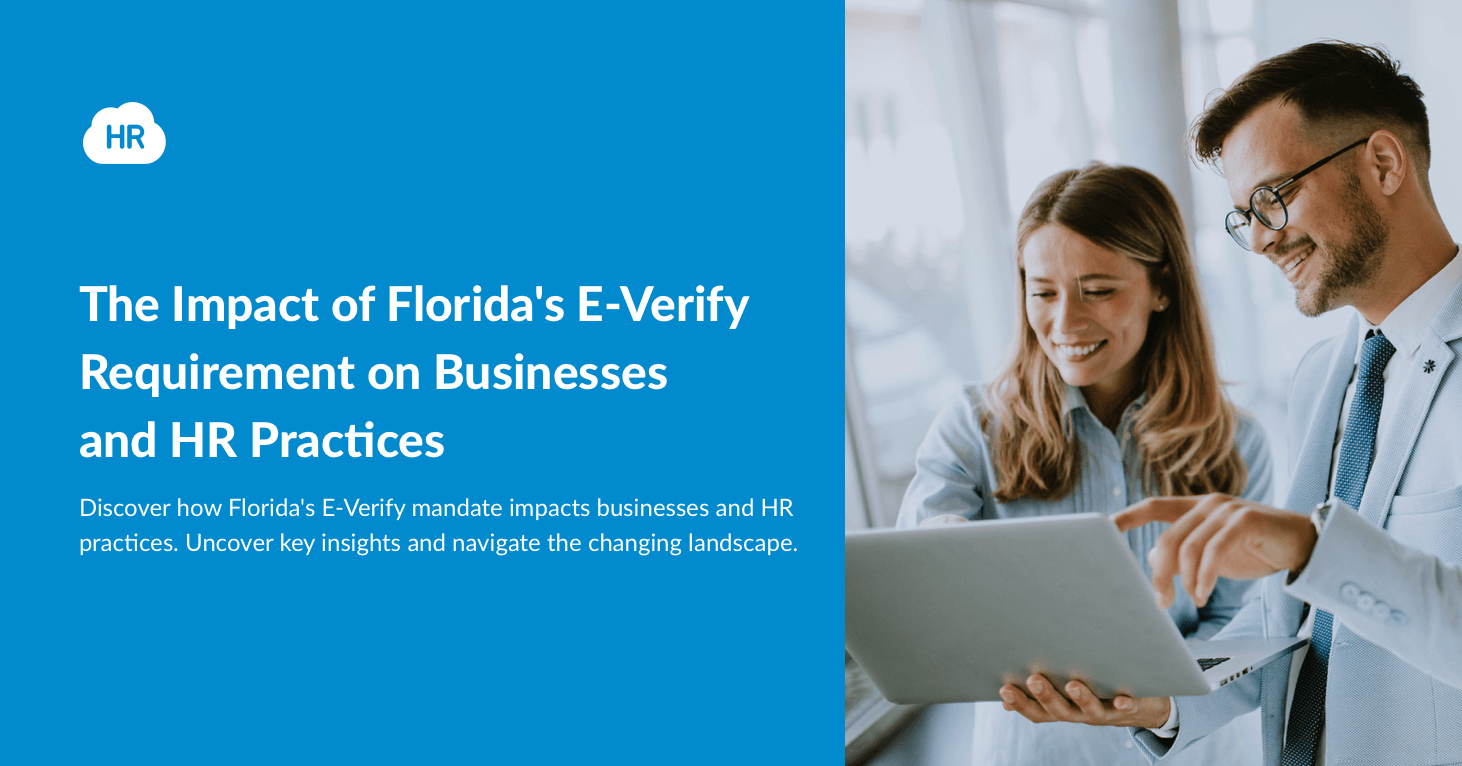
What is E-Verify
E-Verify serves as a vital tool for verifying employment eligibility. It plays a significant role in the context of Florida's E-Verify requirement. This user-friendly system allows employers to confirm the legal status of newly hired employees, promoting a compliant workforce. By electronically cross-referencing employee information with government databases, E-Verify helps businesses ensure they hire authorized workers.
Understanding the inner workings of E-Verify is essential for businesses and HR practices navigating Florida's requirements. Employers submit an employee's Form I-9 information to the system. Then checks it against records from the Social Security Administration and the Department of Homeland Security. Within seconds, employers receive a confirmation or tentative non-confirmation, allowing them to proceed accordingly.
The significance of E-Verify lies in its ability to assist businesses in maintaining a legal and authorized workforce, promoting compliance with immigration laws. It provides peace of mind by reducing the risk of employing individuals without proper work authorization. Thereby safeguarding businesses from potential penalties and legal consequences.
Take a look at Onboards E-Verify solution for smooth sailing.
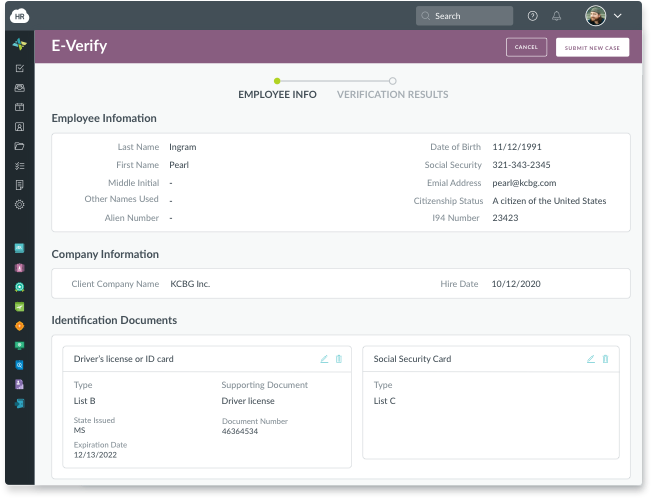
How E-Verify works
E-Verify streamlines the process of employment verification, providing businesses with a reliable tool to ensure a legal workforce. Understanding how E-Verify works is essential for grasping its impact on businesses and HR practices in the context of Florida's requirement.
-
Initial Submission: Employers enter employee information from the Form I-9 into the E-Verify system, including name, Social Security number, and work eligibility status.
2.Cross-Referencing: E-Verify electronically cross-references the submitted information with records from the Social Security Administration and the Department of Homeland Security.
3.Verification Results: Within seconds, employers receive a verification result. There are three possible outcomes: "Employment Authorized," "Tentative Non-Confirmation," or "DHS Verification in Process."
-
Employment Authorized: This confirmation means that the employee's information matches the government records, indicating work eligibility.
-
Tentative Non-Confirmation (TNC): In some cases, E-Verify may generate a TNC. This means that the information provided by the employee does not initially match the government records. The employer must notify the employee to resolve the discrepancy.
-
DHS Verification in Process: Occasionally, E-Verify may require additional verification from the Department of Homeland Security (DHS) before providing a final result. In such cases, employers should follow the instructions provided by the system.
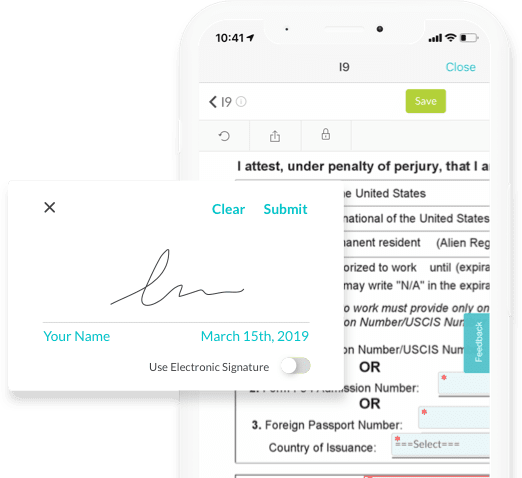
4.Resolution Process: If an employee receives a TNC, they have the opportunity to contest the result and resolve any discrepancies with the appropriate government agency. Employers must provide the employee with a referral letter and allow them a reasonable amount of time to take necessary actions.
5.Final Confirmation: Once any issues are resolved, E-Verify provides a final result. If the employee is confirmed as authorized to work, the employer can proceed with confidence, knowing they have met their obligations under the E-Verify system.
By simplifying the process of employment verification, E-Verify empowers businesses to maintain a compliant workforce. It minimizes the risk of employing unauthorized workers while facilitating efficient and accurate verification procedures.
As we delve into the impact of Florida's E-Verify requirement on businesses and HR practices, understanding how E-Verify works is crucial for comprehending the practical implications and adapting to the evolving landscape of employment verification.
Florida's E-Verify requirement on businesses and HR practices
Florida's E-Verify requirement has brought significant changes to businesses and HR practices within the state. This legislative mandate compels employers to use the E-Verify system for employment verification, ensuring a legal and authorized workforce. The requirement encompasses all employers in Florida, with exceptions for federal contractors and agricultural employers. By implementing E-Verify, businesses aim to promote compliance with immigration laws and reduce the risk of employing unauthorized workers.
Explanation of Florida's legislation and its key provisions
Applicability: The requirement applies to all employers in Florida with 25 or more employees.. There are certain exemptions for federal contractors and agricultural employers.
Mandatory Use of E-Verify: Employers must use the E-Verify system to verify the employment eligibility of newly hired employees. This involves electronically submitting the required employee information for verification.
Retention of Records: Employers must retain records of the verification process and related documents in compliance with state and federal record-keeping requirements.
Non-Discrimination: Employers must ensure that the E-Verify requirement is applied uniformly. Without discrimination against job applicants or employees based on their national origin or citizenship status.
Take Advantage of E-Forms, Time-Off Tracking, and Other Powerful Features to Help Drive Your Bussines
Learn More about HRMS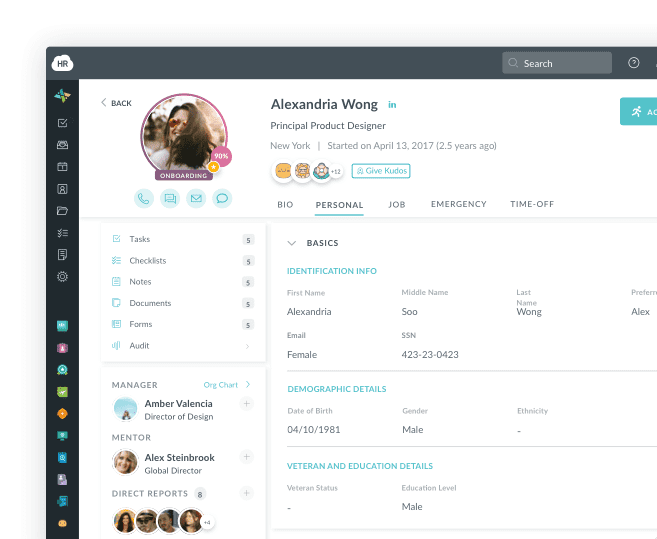
Challenges faced by businesses in implementing E-Verify
Implementing E-Verify poses several challenges for businesses as they adapt to the requirements and incorporate the system into their existing HR practices. These challenges include:
1.Learning Curve: Businesses may encounter a learning curve when initially using E-Verify, especially if they are unfamiliar with the system.
2.Increased Administrative Burden: E-Verify adds an additional layer of administrative tasks for HR departments. This includes entering employee information accurately, verifying documentation, and managing the compliance and record-keeping requirements associated with the system.
3.System Downtime and Technical Issues: Like any technological platform, E-Verify may experience occasional system downtime or technical glitches.
4.Limited Non-English Language Support: E-Verify primarily operates in English, which may present challenges for businesses with a multilingual workforce.
Keeping Pace with Changing Regulations: Immigration laws and E-Verify requirements can undergo updates and modifications over time. Staying up to date with these changes and ensuring compliance with evolving regulations pose ongoing challenges for businesses. Regular monitoring of legal updates and proactive adjustments to HR practices become essential to maintain compliance.
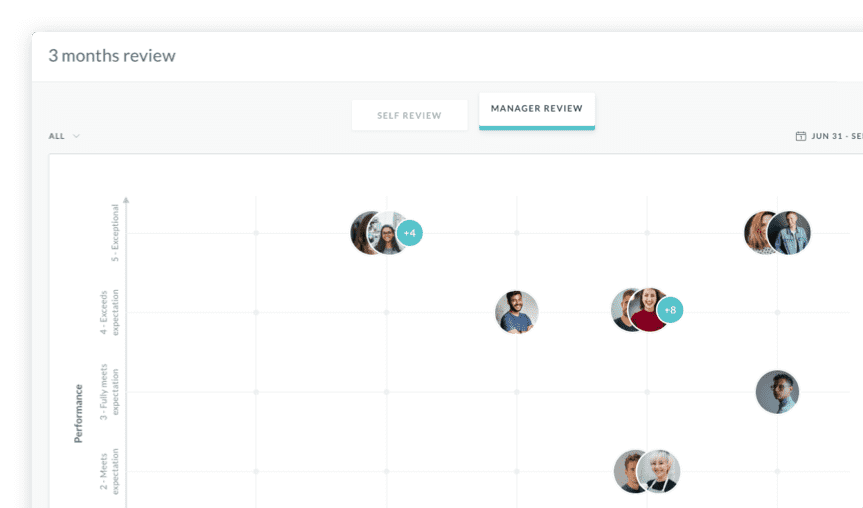
Solutions for Florida’s E-Verify Requirement
As businesses navigate Florida's E-Verify requirement, leveraging efficient solutions becomes crucial for streamlining the employment verification process. One such solution is the feature-rich offering provided by HR Cloud. Our software simplifies the E-Verify process, offering businesses a comprehensive platform to manage Form I-9 compliance and seamlessly integrate with the E-Verify system.
HR Cloud solves these issues with a modern I-9 compliance solution. As part of our industry-leading Onboarding solution, our I-9 software automates the process of collecting I-9 forms and then integrates this workflow with the Department of Homeland Security’s E-Verify system. I-9 forms are then cross-checked with the appropriate government departments for full compliance.
With HR Cloud's software, businesses can automate the collection and storage of employee information, reducing manual data entry errors. The user-friendly interface guides HR personnel through the verification process, ensuring accurate submissions and compliance with E-Verify requirements.
Take a look at our Onboarding software solution.
Integration for ADP Users
You can integrate ADP with our Onboarding solution.
Upon onboarding, individuals are guided through essential processes to ensure the proper completion of forms and adherence to deadlines. With Onboard anyone can electronically sign, save, revise, and audit I-9s using any device. The HR department has the capability to directly submit employment verification requirements to agencies or establish recurring tasks to maintain compliance throughout each employee's lifecycle.
Conclusion
Florida's E-Verify requirement has brought significant changes to businesses and HR practices within the state. This legislative mandate aims to ensure a legal and authorized workforce, promoting compliance with immigration laws.
As businesses adapt to this requirement, it is crucial to address challenges through proactive measures, such as comprehensive training, effective integration of E-Verify systems, and staying informed about evolving regulations. By leveraging innovative solutions like HR Cloud's E-Verify software, businesses can streamline the employment verification process and enhance compliance. Embracing these strategies will enable businesses to navigate Florida's E-Verify requirement successfully and maintain a compliant workforce while contributing to a thriving and legally compliant business environment.
Author Bio:
This article is written by a marketing team member at HR Cloud. HR Cloud is a leading provider of proven HR solutions, including recruiting, onboarding, employee communications & engagement, and rewards & recognition. Our user-friendly software increases employee productivity, delivers time and cost savings, and minimizes compliance risk.
Keep Reading
Retention Reset: How to Keep Your Best Talent in 2025
More employees are walking away from their jobs in 2025 not just for better pay, but for
Remote Onboarding Done Right: A Step-by-Step Guide for HR Teams
Remote onboarding is the process of welcoming new employees who work from home or

